I had a multi-day-long book hangover after finishing Louise Kennedy’s Trespasses.* Its ending snuck up on me, gutted me, even as the text was so heavy with foreboding as to make a happy ending out of the question. Let’s dig in.
One of the central things I have been turning over: is this a romance or not? I think the genre matters here because Kennedy is clearly playing with some of the hallmark conventions of romance and centering a love story as the plot engine, and yet the book ultimately drifts from and challenges genre norms. (What does it mean to be a love story turned war story, or a love story turned crime story? How does this shift impact our expectations?) The novel begins with pulpy romantic drama: the unfolding of a forbidden love between a Catholic schoolteacher, Cushla Lavery, and an esteemed Protestant lawyer, Michael Agnew, during the fiery and violent Irish Troubles. Some of Kennedy’s lines in the opening run left me swooning: “The room looked better with him in it” gave me the same knee-buckling sensation as Matthew Macfadyen’s hand flex as Mr. Darcy in the 2005 Pride and Prejudice.** Michael’s calm chivalry in Cushla’s defense at the family bar left a lasting mark, too. And I loved the way Kennedy inserted pointed ellipses in Cushla’s monologue when it came to their nascent affair, leaving me to guess at how she was feeling (riotously in love, lusting!) and inviting us to imagine the thrill of being young and desired by someone handsome, older, smart, and — most powerfully — taboo. (“She had never given much thought to how she looked behind the bar, throwing on clothes she didn’t mind splattering with bleach, tying her hair up to keep it from her eyes. Not until now.” And later: “His voice was so beautiful she felt as if she was being read to.” !!!!) I was swept up in it, awash! Damn the detractors, damn the plot’s sinister presentiments: I wanted Cushla and Michael together.
As the plot progressed, though, I found the book was less interested in the romance of the romance and more focused on its morbid and self-immolating context. By this I mean that we know — we know! — things will end badly between the two of them. We have not just red flags and forewarnings in the form of Mr. McGeown’s brutal injuries, bomb threats, escalating physical and verbal violence of various kinds, but also the increasingly dangerous nature of the work Michael is taking on as a barrister, and his crescendoing agita and carelessness. We witness also various women at the ends of their tether, warning us to the aftermath of upset: Cushla’s mother is a barely-functioning alcoholic, and Michael’s wife is in an ongoing situation of psychiatric treatment. Throughout the rising action, we encounter many mixed and mis-received messages, and the stakes in each (mis-)transmission run impossibly high, as is the case when Cushla’s well-meaning intercession on her student’s behalf threatens the McGeown family’s ability to stay together. In other words, we spend a lot of time in the novel looking at bad outcomes at attempted connections, and we know, too, that Cushla and Michael are doomed thanks to the frame story. There is no possible way their illicit romance will survive. And yet! I gasped, reader, at the news of Michael’s murder.
What, then, is Kennedy saying about romance? Is it untenable in times of war? Are certain conventions unjustifiable in conditions of grave violence? Looking at this question on a plot level: will familial/community belonging, and the dark underbellies that can accompany those sentiments (segregation, homogeneity) always supersede an affair of the heart? I don’t know that Kennedy offers answers to any of this, but she is pointing us at conditions inhospitable to romance, and the case love makes for itself is not a winning one.
I found the frame story (Cushla looking upon a statue of Michael in a gallery as an older woman when she runs into the young student, Davy) strikingly — almost jarringly — optimistic. In her younger years, Cushla had lost Michael, but she had also proven herself capable of deep love for the people in her world, and those people saw her for it–including, I think, her discerning and flinty mother, who demonstrates surprising nurturing toward Cushla after Michael has died. I was shocked, too, by the tenderness and resiliency both Cushla and Davy demonstrate at the novel’s end, when both might have been hard-hearted and world-wearied. I wondered whether Kennedy was saying something about different kinds of devotion. This seemed to fit with the book’s cacophonous pair of epigraphs: an excerpt from a poem that underscores the irresolvability of the Irish war and a quote from Stanley Kubrick: “Ah! That first affair, how well one remembers it!” The Kubrick quote led me into the text thinking that the story was going to be over-romanticized, and I continued to think back on it and wonder whether Kennedy was using it to underscore the notion that the romance was not the most important bit of the story. The quote repositions their tryst in an interesting way. (Was it love, after all? Michael is a known philanderer, and much older than Cushla, too; there are moments of doubt on Cushla’s end.) This led me to believe that Kennedy was intentionally demoting the romance plot; in turn, the love story felt like a narrative feint, drawing us in and investing us in its parties while planning to rent us in two. In this way, our reading of the romance was not too dissimilar from its lived experience. Both parties knew it was an impossible affair, but went for it anyway–a subversive dramatic irony.
Finally, I have to lavish praise on the exceptional prose in this book–a poetic pastiche of gorgeous observations, clever dialogue, and Joyceian monologue. (If you are a Sally Rooney lover, you are in for a treat.) I loved Kennedy’s heavy use of the comma and sentence fragment. They lived out the layered irresolution of the Irish Troubles and of falling in love during that time period on a grammatical level. There were so many breathtaking passages in which we sift through layers of comma-separated description, or fragments of sentences, and the phrases clarify or re-interpret or otherwise bob against one another, unwilling to resolve to a fine point, in one long breath. It is spectacular writing that refuses to fill in the blanks when it doesn’t need to, and that also refuses to translate in many situations (i.e., incorporating local patois and Gaelic). This is a book that masterfully shows and does not tell, translate, or annotate itself.
What were your thoughts?
Post-Scripts.
*Re: book hangovers: there is a fantastic line in which Cushla talks about her book hangover after reading Jude the Obscure. ” ‘Is it that good?’ [Tommy] said. ‘It was months before I opened another book. I was afraid of what I might find between the pages.'” Ah!!! Yes! I’d probably phrase it the inverse: “I was afraid of what I might not find between the pages.”
**If you are a fellow P&P 2005 fangirl, I absolutely LOVED this little Instagram reel of a bunch of women watching the hand flex scene in a theater and squealing with joy. The sisterhood of it! GAH! So good!
+I could not be more excited for the screen adaptation of this novel, due out possibly later this year? Gillian Anderson plays Gina Lavery, Cushla’s tart, wise-cracking mother and I cannot imagine a better casting. I need to know who will be playing Tommy!
+In the acknowledgments, Louise Kennedy comments that the cover art made her fall in love with the title of her book! How gorgeous is that?! Below, with some other artful things: my Undo hair clip and beloved Appointed notebook. (Wearing this dress!)
+My book, Small Wonders, is now available for pre-order! This is a collection of essays, musings, and list poetry on the art of paying attention, noticing love in its smallest denominations, and finding the miraculous in the mundane. It is an extension of the writing here on the blog, and is organized around the themes we often discuss here: the dance of motherhood, inheritances and intimacies, the natural world, and the wide world of language. I am so proud of it and hope you will find it a worthy companion for your legato-style mornings.
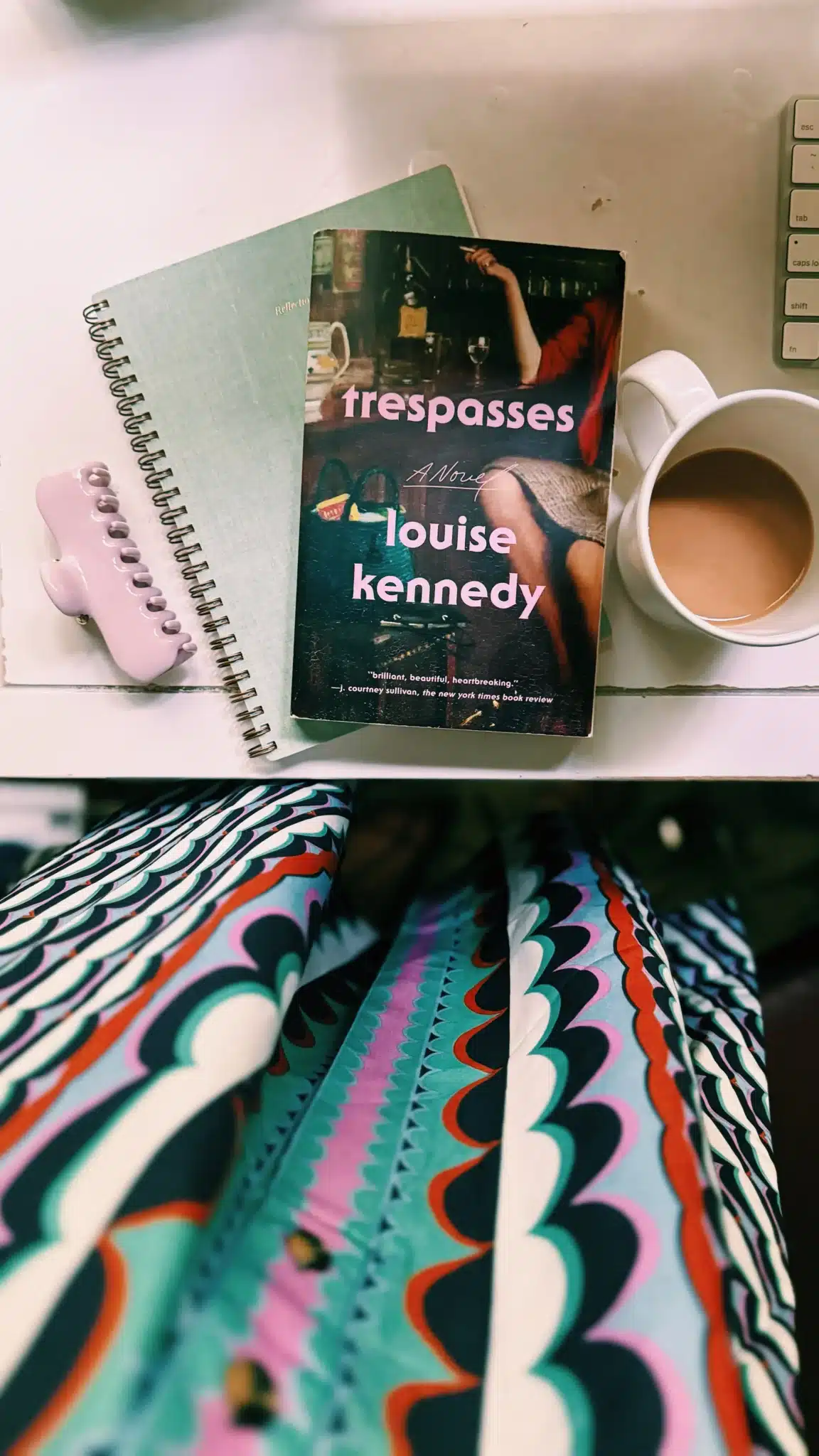
Trespasses Book Club Questions.
+Do you think Trespasses is a romance? Why or why not?
+There are many instances of mistransmission in the book: unanswered calls, misdirected calls, Cushla’s Irish language lessons. What might Kennedy be getting at with this motif?
+What did you make of the familial relationships between Cushla, her mother, and her brother on the one hand and Michael and his wife on the other? We witness friction, and yet they continue to return to one another, and support one another (with varying degrees of sensitivity). How did this relate to the devotion between Cushla and Michael?
+Why do you think Kennedy had Tommy kill Michael? What point might she have been making, given Cushla’s connections to both the murderer and the murdered?
+Do you think Michael truly loved Cushla? Does this matter? Why or why not?
Trespasses Playlist.
I put together a mainly-mid-1970s playlist for this novel that felt like the perfect canvas for its screen adaptation; the irony of these songs against the bleak backdrop of The Troubles will make its own point. I mixed in a couple of more contemporary songs that felt right for the book’s mood, too. You can listen on Spotify here and on Apple here. I have been vibing to this playlist all week!
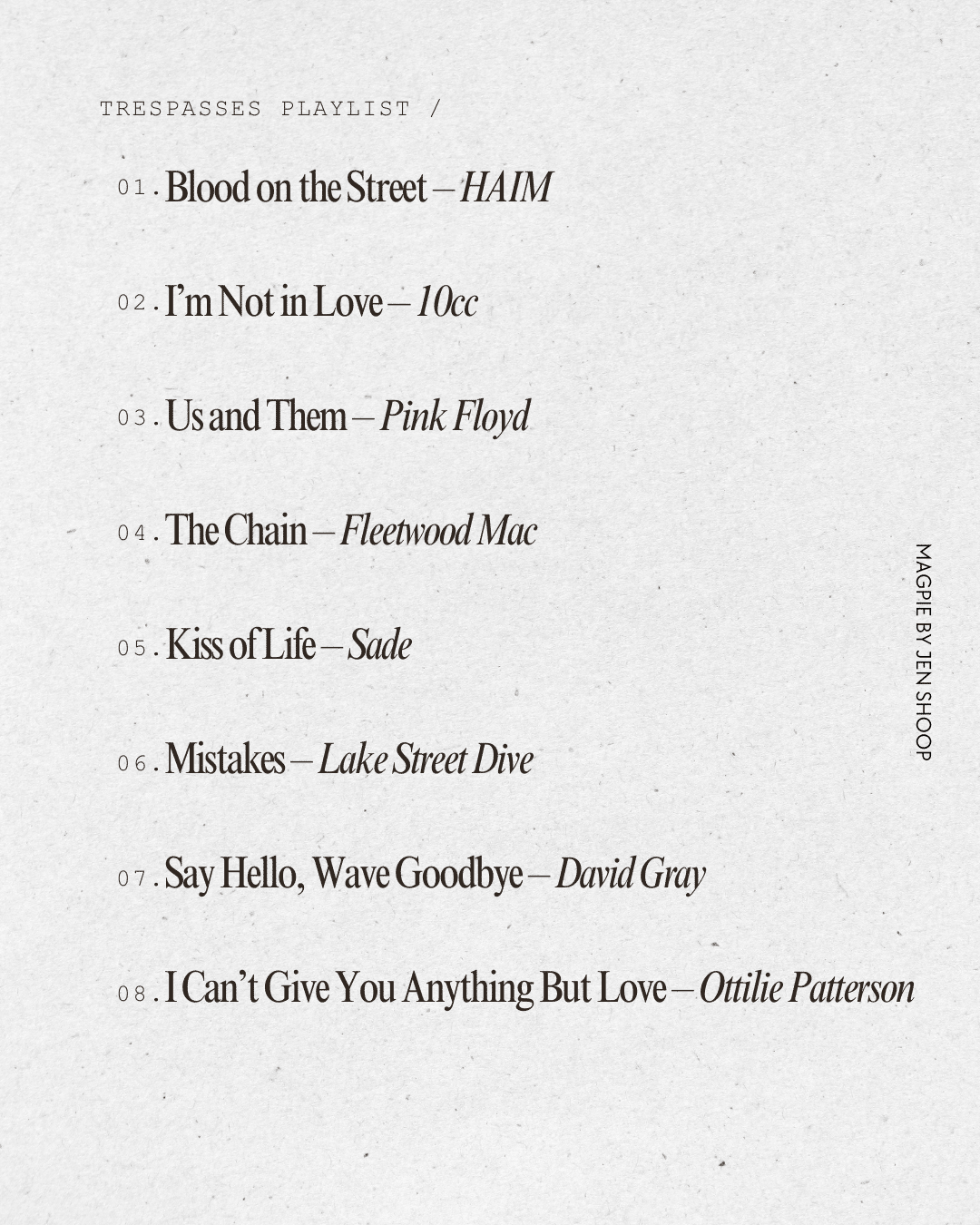
Trespasses Mood Board.
I have such fun putting together visual moodboards for these gorgeous books we’ve been reading to further immerse myself in the experience.
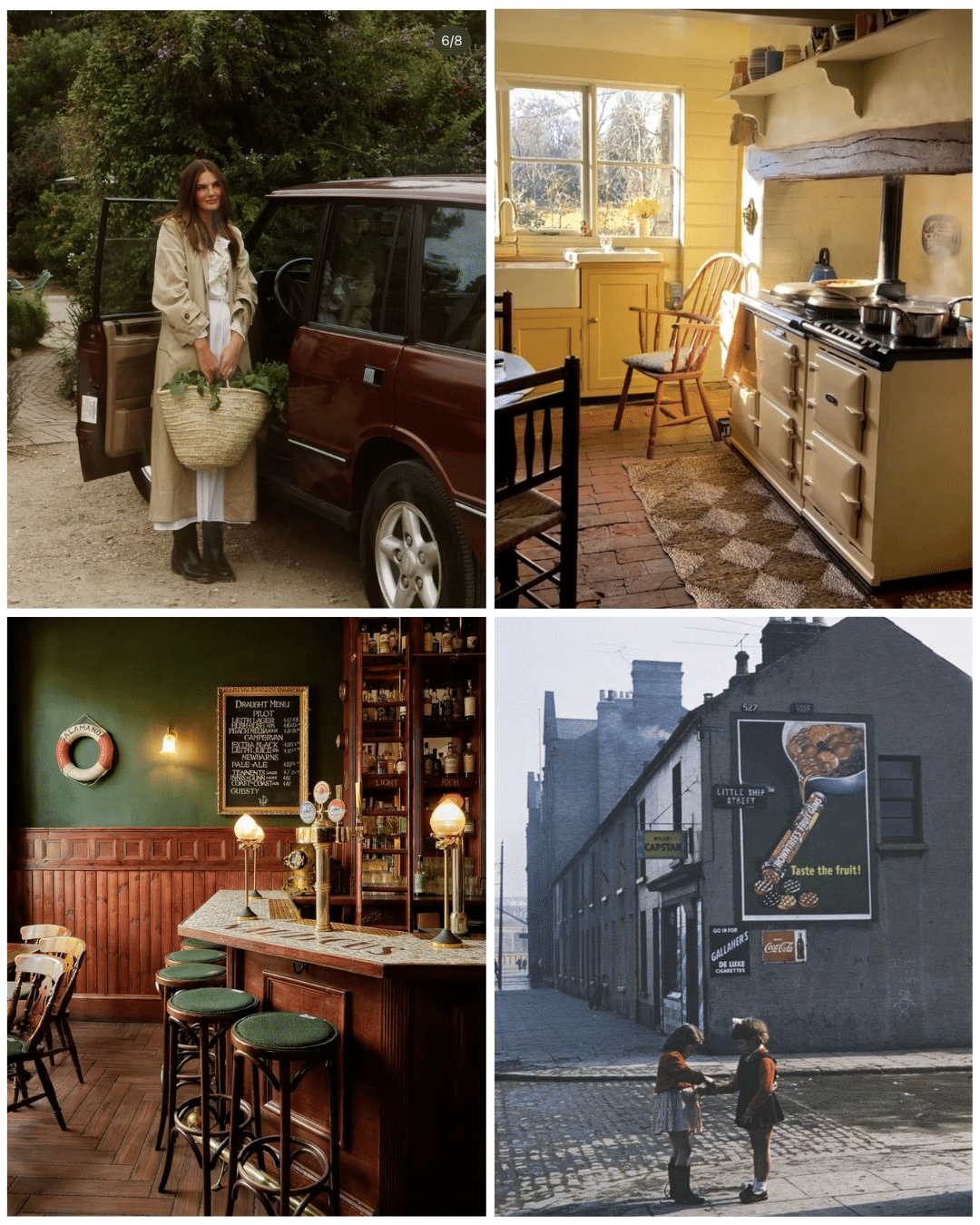
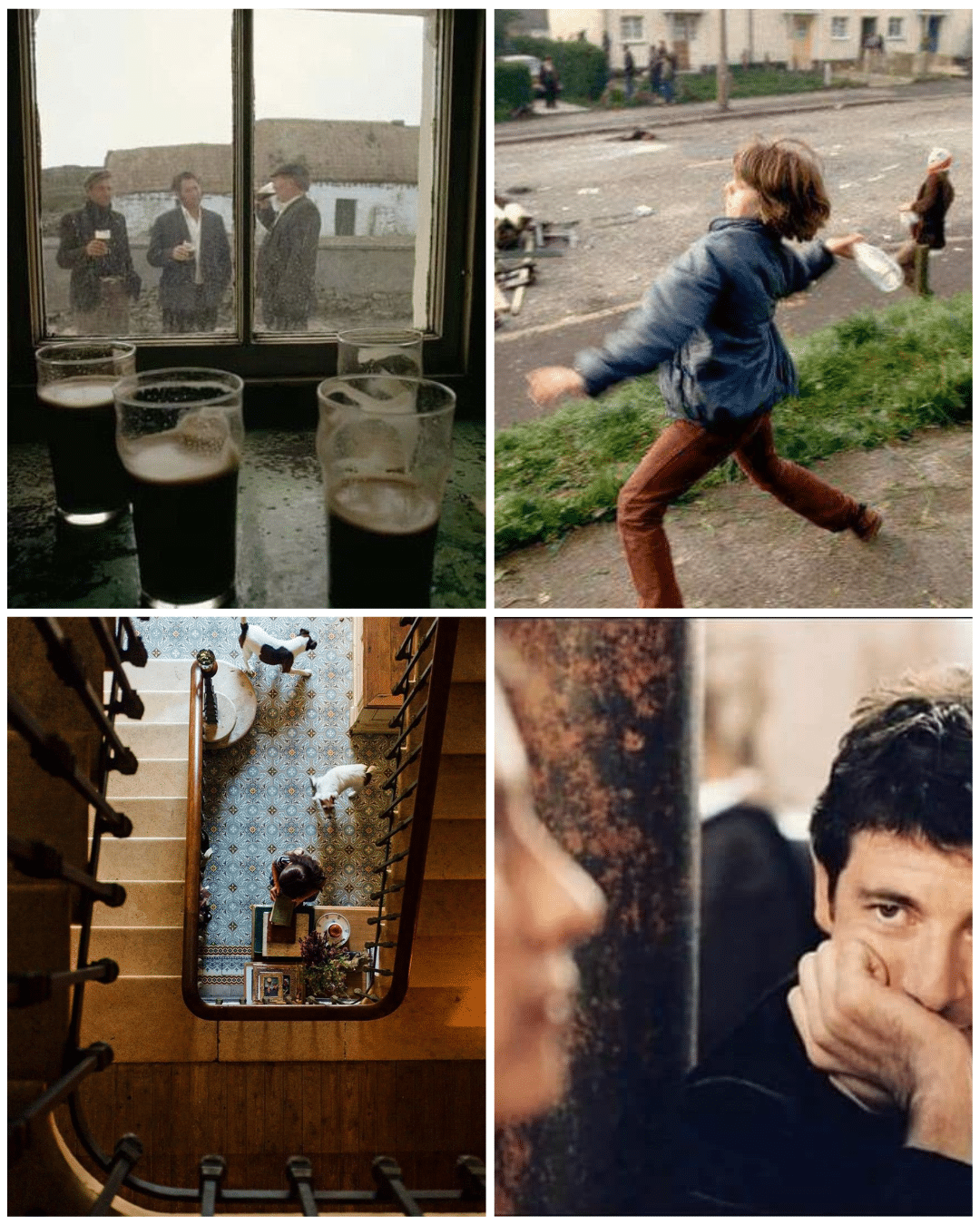
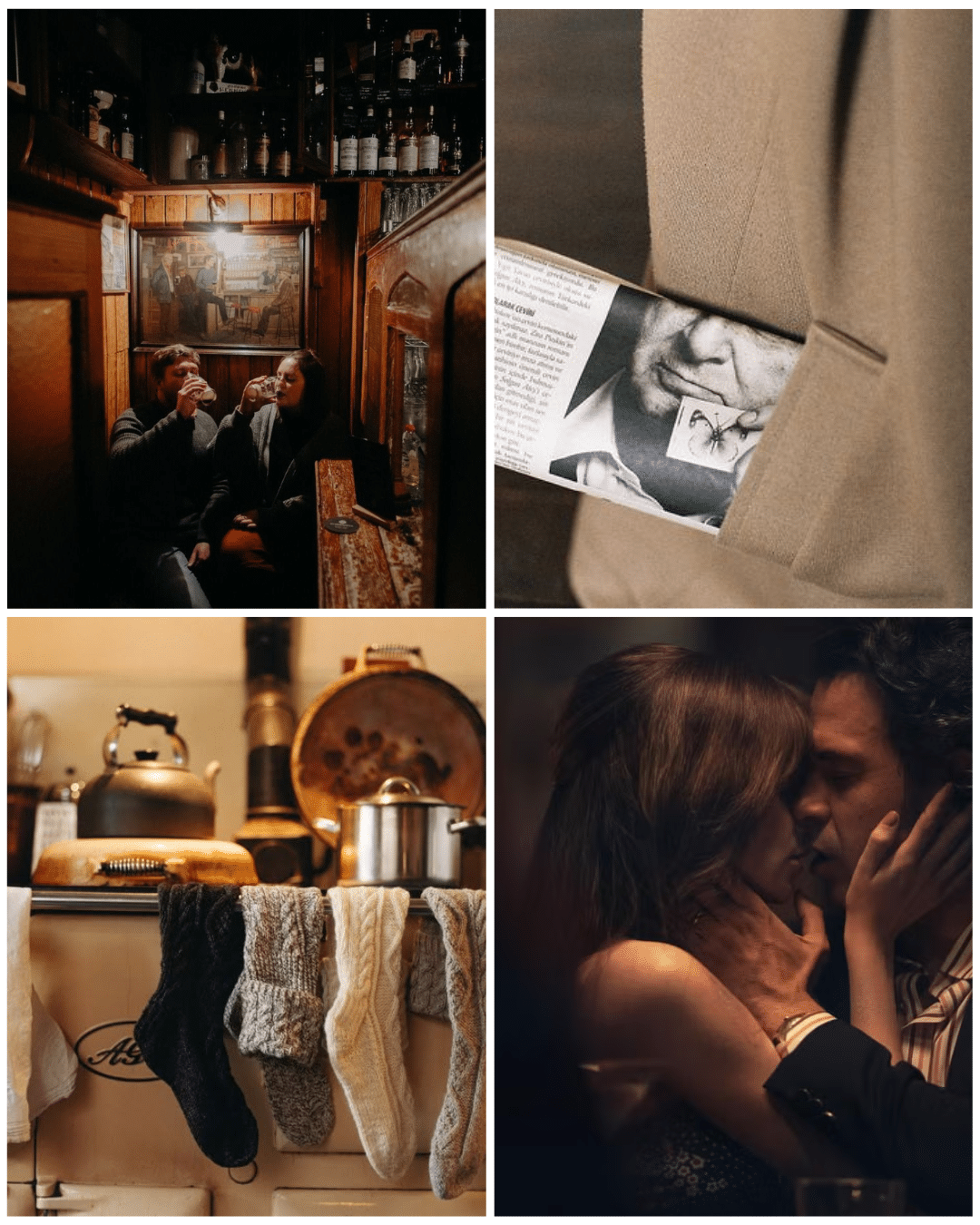
Next Month’s Book Club Pick.
I had a difficult time picking this month’s read! My finalists below. Small Things Like These felt like a natural follow-on (also set in Ireland, also made into a movie!), but I read a sample of Charlotte Wood’s Booker-Prize-shortlisted Stone Yard Devotional and was drawn in (clear, crisp writing). I thought a thriller set in an elite prep school environment might be a welcome palate cleanser (Fox), but ultimately, I decided to go with Isola — the story of a 16th century heiress who is abandoned on a small island off the coast of France — because several Magpies had been chirping about it! The cover art made me think of two other texts I absolutely love: Circe and “Portrait of a Lady on Fire” (wild and brilliant 2019 film).
You can find all the books on my radar for our book club here; please (please!) make your suggestions and vehement recommendations in the comments section below!

FOX // ISOLA // STONE YARD DEVOTIONAL // SMALL THINGS LIKE THESE
If you’re looking for a lighter read, I am just opening These Summer Storms, which people have been raving about! This and an Elsie Silver cowboy romance are my current sidecar reads. More great summer beach reads for 2025 here. I’ve read most of these (and then some), but still have a couple to tackle! This one just came out this month!
P.S. Last month’s book club pick here. And my book review on Wild Dark Shore, which we LOVED!
P.P.S. It’s just that — we have so little time with the ones we love.
P.P.P.S. 10 I Love Yous.


I would love to have your thoughts about Acts of Desperation, accompanied by your strong moodboards, such an experience it will be!
Thank you, Kate!! It’s toward the top of my TBR…do you think it’d make a good book club pick from a discussion standpoint? I am dying to read it!!
xx
There’s just SO much going on there and feels like each topic could be a whole post on its own. Toxic relationship, obsession, need for validation, insecurities, manipulation! A deep dive into the core of a poor soul.
Yes, sounds like a lot to unpack! Can’t wait to read and compare notes.
xx
Little disjointed because I stayed up late finishing the book to join the discussion! “She took the one from the top of the pile and began to flick through it. It was an epic love poem, “Caoineadh Airt Uí Laoghaire,” that she had studied in school.” A death lament for a lost husband, how heavy the foreshadowing??
Jen, have you read Ghost In the Throat yet? It is about the writer of the aforementioned poem. Another gorgeous Irish novel I love from magpie recs. Another book hangover.
Trespasses is not a romance: there is no HEA or HFN. I’m a staunch traditionalist in this regard.
I think Cushla’s family life has moments of tender care, but the fights and the gin and the selfishness make those moments stand out sharper. I think Cushla is seeking family and care, both with Michael and with the McGeowns, and I wish she’d been able to find more happiness with them. I don’t see Michael as particularly devoted, nor Cushla as particularly in love: she adores him but does not know him. I don’t think Michael “truly” loves Cushla, nor do I think it matters. I think cheating is inherently a deep disrespect, a poisoned root. Not consensual nonmonogam, but the disrespect he has for his most fundamental relationship to me means he will never build something real with Cushla, and I think meeting Marjorie underscores that to her. However, the selves they are hiding (they are both caregivers clawing desperately for comfort) might have more in common than the people they’re pretending to be.
I think Cushla’s connection on both sides added to the shock, and to the empathy of it. Very “there but for the grace of god…”, lots of near misses, things that were almost more tragic alongside random violence, the daily monotony of it becoming repetitive. I like the way she stuck to standard language in the news bulletins, it underscored it.
I was in Killarney recently. I am aware of undercurrents, IRA anthems I heard on the radio, my husband’s Irish Catholic family, the fields of athenry, the legacy of forced famine feeling so timely today. I can’t ever hear about the troubles without weeping, but my people came over a hundred years ago, before the bombings, and were Protestant besides. I remember when Lyra McKee was killed. I am Catholic but not Irish Catholic. The liminal space in the books, the distrust between neighbors alongside Fidel’s kindness, it felt weighty and human.
Portrait of A Lady On Fire is one of my all time favorite movies. The way the shots are framed! Genius. The novel I’m meant to be writing when my two start school is like Portrait x Schitt’s Creek.
PS if anyone needs a romance palate cleanser I highly recommend Olivia Dade’s ridiculous ZomRomCom.
What a gorgeous reading – I loved the way you captured Cushla and Michael’s relationship, especially your note on how they are both “caregivers clawing desperately for comfort.” I so appreciate with that capture; it really helped something click into focus for me. I also completely agreed with the “things that were almost more tragic alongside random violence.” The cycle of violence, the reading of the news, is such heavy foreshadowing and at the same time becomes monotonous, inures you to the imminent threat of Michael’s murder.
Thanks so much for sharing this. Wow, Portrait x Schitt’s Creek!! Now this is something I need to read!
xx
Can’t wait to hear your thoughts on Isola – I read it earlier this summer and it has strongly stuck with me, a dozen or so books later. I DNF-ed Stone Yard Devotional 40% through, which is highly unusual for me. The writing drew me in initially, as well, but it so… so… slow. Nothing happened? At all? Even so, I can usually muddle through a book but this one seemed completely aimless. Frustrating, because it was highly reviewed by a few of my trusted sources! You made the right pick with Isola, especially for a Magpie book club deeper dive. Can’t wait to follow along!
Oh yay! I’m so glad. After picking this book, my mom also chimed in that she’d read it earlier this summer and LOVED it, especially on audiobook! Can’t wait to catch up on this in the comments!
xx
LOVED this book and also love you dedication in crafting the playlist! would also add Barenaked Ladies – Lovers in a Dangerous Time (somehow plays in the back of my head while i’m reading this) and also I think a place for the Lament of Cu Chilainn (“Caoineadh Cu Chulainn” famously used in Riverdance)
OMG – the Barenaked Ladies IS PERFECT. I just added to the playlist; I hope you don’t mind?! Thanks for the addition. I totally agree; it’s just right for the book and for the mood of the playlist. Thank you!
So glad you loved this book as much as I did!!
xx
I’ve been eagerly anticipating this post! Finally joined the book club this month. I enjoyed this more than I thought I would. I generally don’t like reading about people making bad decisions (but I realize there needs to be some conflict!) and I found the lack of quotation marks distracting, but the story won me over. My favorite line was when she went to the wedding with Gerry and started to tear up, until she thought of her mother as mother-of-the-bride and the tear got sucked back in! I’m wondering – do we add historical fiction to the genre discussion? While reading, I realized I rarely read anything set in recent history. Usually modern times or WWII or earlier. I found myself working hard to mentally picture the cars, fashion, etc.
For next month, my vote is for Fox (school setting seems appropriate for September) or Isola (that cover!). I read Small Things a few years ago and enjoyed, but maybe push that one back to November/December since it’s set at Christmas? V basic, I know, but I love to read seasonally!
Oh I’m so GLAD you enjoyed this as much as I did! I loved that line, too. In general, I loved the sparring but loving relationship between mother/daughter. Another exchange between them that was just perfect:
“Anything strange or startling, Cushla?” asked Marian.
“No.”
“Ha!” said Gina. “Apart from staying out all night.”
Marian giggled. “Who with?”
“A wee teacher,” said Gina, willing to enter an alliance with her sworn enemy to humiliate her own daughter.
The writing is SO sharp here; I almost felt like Kennedy was chastising Gina herself. Just so good.
And what did we make of Gerry? Poor Gerry, I didn’t even mention him. I also loved Davy!
xx
Please be sure to read Orbital by Harvey
OMG! Great minds think alike. This was last month’s book club pick; my full review here:
https://magpiebyjenshoop.com/book-review-orbital-by-samantha-harvey/
Please join me in the comments and share your thoughts!
xx
I fear my uber literary days are behind me because I admittedly found it challenging to get through this book… I adore reading your review though because it highlights the beauty within that I was unable to grasp hold of myself. Have you dove into the unselected journals of Emma M. lions series yet? It is scrumptious!!
Hi Kristen! No, sometimes a book just doesn’t land for me,t oo — I’ve had this happen a few times with books people absolutely LOVE and rave about! Glad you enjoyed my review nonetheless!! I haven’t read that series yet – adding to my TBR! TYSM!
xx